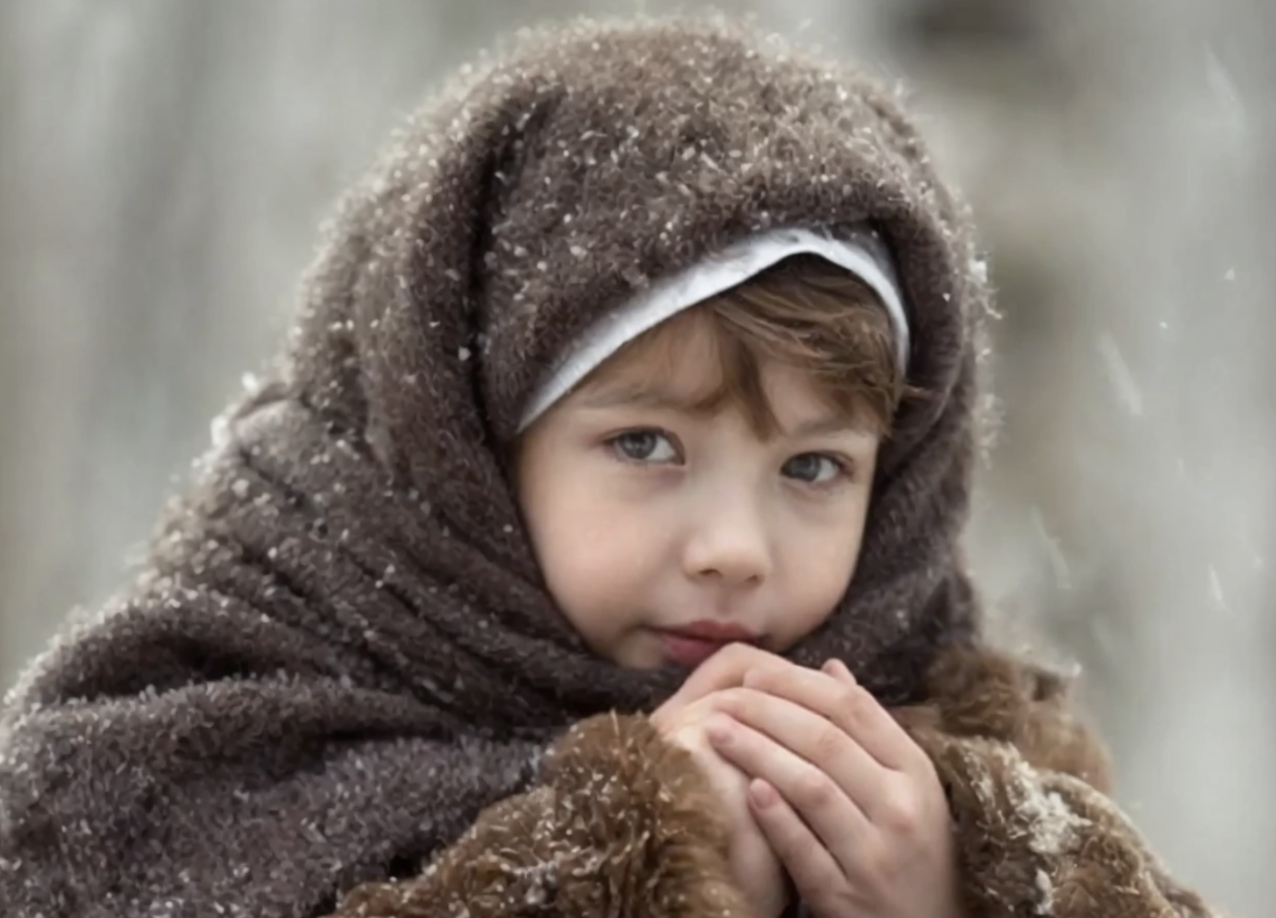The mother left on Wednesday afternoon and told her daughter not to go outside. When Polinka went to bed, the stove was still warm, but by morning the house had cooled down.
There was no sign of her mother, so the girl climbed out from under the blanket, slipped her feet into her felt boots, and ran to the kitchen. Nothing had changed there.
A sooty pot stood on the table. In it—Polinka remembered—lay four potatoes, boiled in their skins. The girl had eaten two the night before going to bed. A nearly full bucket of water stood on the floor.
Polinka peeled two potatoes and had them for breakfast, dipping them in salt and washing them down with water. The cold draft from the cellar made her return to bed.
She lay under the blanket, listening to the sounds from the street. Polinka waited for the gate to slam shut and her mother to return. She would fire up the stove, and the house would warm up. Mom would cook potatoes and dump them on the table, and Polinka would roll them around, trying to cool them faster.
Last time, her mother brought two pies with cabbage, and Polinka ate them, washing them down with hot tea. Now, there were neither pies nor tea, and most importantly—it was already getting dark outside, but her mother still hadn’t returned.
Before it got completely dark, the girl sneaked into the kitchen and ate the remaining potatoes, scooped a mug of water, and placed it on a chair next to her bed. Then she wrapped herself in her old mother’s sweatshirt, pulled the hood over her head, and climbed back under the blanket.
It was dark outside, and cold in the house. Polinka, a little girl of six, lay in bed under an old quilted blanket, trying to warm up, and waited for her mother to return.
In the morning, nothing had changed, except it was even colder in the house and there was nothing to eat.
Polinka dragged five logs from the hallway—it took her two trips to do so. Then the girl pulled a stool to the stove, stood on it, and used the poker to open the damper. It didn’t work the first time, and flakes of soot and some debris fell on her.
Polinka had seen her mother fire up the stove many times and tried to do everything just the same. First, she placed two logs inside, then tore several sheets from an old newspaper, crumpled them, and stuck them between the logs, and on top she placed dry birch bark and another log. Then she lit the paper and birch bark. When the logs caught fire, she added two more and closed the door.
After that, Polinka washed about a dozen raw potatoes, placed them in a cast iron pot, filled it with water, and, standing on the stool, pushed it under the stove.
The girl was tired by the time she finished all this, but it seemed to her that the room had gotten warmer. Now she just had to wait for the stove to properly heat the house and cook the potatoes.
Once Polinka had a father, but she didn’t remember him. He had packed his things and moved to the city because her mother often visited her friends and, as grandma used to say, “drowned her sorrows.”
While grandma was alive, Polinka had a good life. The house was always clean, warm, and smelled of pies. Grandma often baked pies with cabbage, carrots, and berries.
She also cooked delicious millet porridge in a cast iron pot—she would place a plate in front of Polinka and next to it—a mug of baked milk.
Back then, there was a television in the house. Polinka watched cartoons, and grandma watched movies, which she referred to by the strange word “serials.”
Without grandma, life became quite bad. Mom would leave during the day and return at night when Polinka was already asleep. There was often no food at home, and the girl made do with boiled potatoes and bread.
Last spring, mom didn’t plant a garden, so this year there were even fewer potatoes. Polinka didn’t know what happened to the television. Mom had never left for as long as this time before.
The house was warm now, the potatoes were cooked. Polinka found a bottle of sunflower oil in the kitchen cupboard. There was only a tablespoon of oil left, but hot potatoes with oil tasted much better than cold ones without anything.
After brewing a cup of raspberry leaf tea, Polinka drank the hot tea and felt warm. She took off her mother’s sweatshirt, lay down on the bed, and fell asleep.
She was awakened by noise. In the room, the neighbors were talking—old lady Masha and old man Egor, and some unknown person.
“Zakharovna,” the stranger addressed old lady Masha, “take the girl for a couple of days. I called her father—he will come on Sunday.”
“An investigator and a doctor from the district will arrive soon. I’ll wait for them here.”
Old lady Masha searched for something to dress Polinka in, but finding nothing, she put the same old mother’s sweatshirt on her and wrapped her in an old grandmother’s scarf on top.
When they stepped into the hallway, Polinka saw something lying near the woodpile, covered with two sacks. A leg sticking out from under one of the sacks wore her mother’s boot.
Old lady Masha took Polinka to her house and ordered her husband to heat the bathhouse. She washed the girl, steamed her well with a birch broom, wrapped her in a large towel, sat her in the ante-room, and told her to wait. A few minutes later, she returned with clean clothes.
Polinka sat at the table in flannel pajamas, wool socks. A white scarf with tiny blue dots was tied around her head. A plate of borscht was placed in front of the girl.
A woman entered the room, looked at Polinka, and sighed heavily.
“Here, Maria Zakharovna,” she handed old lady Masha a large package, “some things for the girl. My own have outgrown these. There’s even a winter jacket. Such a tragedy.”
“Thank you, Katya,” old lady Masha replied and turned to Polinka, “have you eaten? Come, I’ll put on some cartoons for you in the other room.”
That day and the next, several women visited Maria Zakharovna. From snippets of conversation, Polinka understood that her mother had been found frozen in a snowdrift, quite by accident. And someone had called her father, and he would be coming soon.
Polinka felt sorry for her mother and missed her. At night, she cried quietly under the blanket so that no one would hear her.
Her father arrived. Polinka curiously watched the tall, dark-haired man she didn’t remember at all. She was a bit afraid of him, so she kept her distance. He also studied the girl and only once, when they met, awkwardly patted her on the head.
Father couldn’t stay long, so they left the next day. Before leaving, he closed the shutters, nailed the windows and doors shut crosswise, and asked the neighbors to keep an eye on the house.
Old lady Masha told Polinka as they parted:
“Your father has a wife—Valentina. She will be your mother. Listen to her in everything, don’t argue. Help around the house. Then she will love you. Besides your father, you have no one, and you have no other home either.”
But Valentina never came to love Polinka. The woman had no children of her own, and perhaps she didn’t know how to love children. But Valentina didn’t mistreat the girl. She made sure Polinka was always neatly dressed, although she rarely bought new clothes, making do with what colleagues and acquaintances gave her for the girl.
As soon as father brought Polinka home, Valentina “arranged” to put the girl in daycare. In the morning she would drop her off, and in the evening after work, she would pick her up. At home, Valentina immediately started making dinner or doing other household chores, while Polinka sat in her room, looking out the window or drawing.
Father also rarely talked to his daughter, believing he was doing everything she needed: fed, dressed, shoed—what else?
When Polinka went to school, she didn’t cause any trouble to either her father or Valentina. She did okay in school, mostly getting B’s, and C’s in math, physics, and chemistry. But the teachers said the girl tried, it’s just that exact subjects weren’t her forte.
However, she excelled in craft classes, especially when the girls sewed, knitted, or embroidered. Even the teacher was surprised at how skillfully Polinka mastered everything. Olga Yurievna would just show a new stitch or pattern, and Polina would repeat it as if she had known it for a long time.
Thus, Polina lived in her father’s family: from about ten years old, she cleaned the apartment by herself, could iron a mountain of laundry, and from the age of thirteen, she cooked for the whole family. She only interacted with Valentina on household matters, but it seemed Polina didn’t need more than that.
Father was pleased that there were no crises typical of teenage years, which his colleagues with daughters had warned him about. And his daughter’s silence and introversion he considered a trait of her character.
After ninth grade, Polina said she wanted to go to college to study to be a pattern maker and tailor. Father went with her to the industrial-economic college, they submitted the documents, and in September Polina began her studies.
She still did a lot of housework, but now she also started sewing. Valentina had an old sewing machine; Polina fixed it, and now there was no problem if she needed to hem towels, sew new curtains, or mend clothes. The girl did all this herself. Neighbors started approaching her—some needed trousers shortened, others needed custom-sized bedding sewn. She charged little, but she didn’t spend the money—she saved it.
Three years flew by unnoticed. School ended, and Polina turned eighteen.
Unexpectedly for her father, the girl announced that she wanted to return to her native village.
“Isn’t it good for you here? Why are you leaving?” her father asked.
“You raised me, and I am very grateful. But from here on, I’m on my own.”
Polina barely recognized her home. Her village, unlike many others, was not dying but growing—several years ago, a new road was built nearby, new residents arrived, new homes were built.
The house that used to seem huge to Polina now looked like a shabby hut against the backdrop of newly-built two-story cottages. True, several neighboring homes remained the same. There was old lady Masha’s house on one side and old man Egor’s on the other. I wonder if they are still alive?
Polina opened the gate—it creaked just as it did back when little Polinka, listening to that creak, awaited her mother.
The girl climbed onto the porch. “Can’t get into the house without tools,” she thought.
Leaving her things on the porch, she went to old lady Masha’s house. Polina entered the gate and saw an elderly woman weeding a flower bed.
“Hello,” said Polina.
The woman straightened up and looked intently at the girl:
“Hello,” she replied. “And who might you be? The face seems familiar…”
“Maria Zakharovna, it’s me, Polinka.”
“Indeed, Polinka! And you look just like your mother! – exclaimed old lady Masha. – You’ve arrived!”
“I’ve arrived, but I can’t get into the house. Do you have a crowbar or something else to pry off the boards?” asked Polina.
“Just a moment, wait!” she said and shouted towards the house: “Zakhar! Come here!”
A young man in his twenties came out onto the porch.
“Grandson! Grab some tool, help your neighbor open her house.”
Within an hour, all windows and doors were open, and Polina entered the house she hadn’t been in for twelve years. Here, in the hallway, lay her mother the last time she saw her, or rather her legs, clad in brown boots with worn toes.
There on the bed was the quilted blanket under which she tried to warm up. The bucket, the cast iron pot, the sooty pot. Polina felt like she had returned twelve years back.
She remembered old lady Masha’s admonition: “Behave well, and you will be loved. You have no other home besides your father’s.”
“How can there be none? Here it is, old, with a leaning porch, but so dear! – thought Polina. – Here, I will be happy!”
For almost a week she washed, cleaned, laundered, painted. She found a chimney sweep in a neighboring village—he cleaned the chimney and fixed the stove, and Polina whitewashed it. She threw out a heap of old junk from the pantry and the attic, hung new curtains.
Zakhar helped her fix the porch and the fence that had collapsed in several places.
And all this time, villagers who remembered her and her mother came to her house—they were surprised that she had decided to move here from the city.
Father probably wouldn’t recognize his quiet, introverted daughter—the smile never left Polina’s face. She was talkative and friendly.
The local tractor driver plowed her garden, and although it was late, but with Maria Zakharovna’s guidance, Polina managed to plant something and tidy up the berry bushes.
“It’s alright, this year you were late with the seedlings, but next year you’ll plant everything you need,” old lady Masha said.
Having finished with the house, Polina got a job—not yet in her field. There was no atelier in the village where she could work, and she didn’t have a sewing machine. So, she went to work at the post office. And not behind the glass but delivering mail to three neighboring villages.
She was issued a government-issued bicycle, and Polina went pedaling: two kilometers to one village, three to another.
With her first salary, she bought a sewing machine, with the second—an overlock. She started sewing—first for the home, then customers found her. Of course, the village wasn’t the city, but little by little, even people in neighboring villages learned about her. People started coming.
And after a couple of years, another postman was delivering the mail—Polina had enough from her garden and sewing earnings. Especially since it was already hard for her to ride a bicycle—she and Zakhar, whom Polina had married, were expecting their first child.
Polina kept in touch with her father and Valentina; they came to the wedding, invited the young couple to the city. But they refused:
“My home is here,” Polina said



